| Srl | Item |
| 1 |
ID:
189952
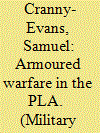

|
|
|
| 2 |
ID:
079901
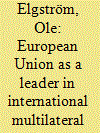

|
|
|
|
|
| Publication |
2007.
|
| Summary/Abstract |
This article analyses the leadership role of the European Union (EU) in international multilateral negotiations. The purpose is to problematize the role of the EU as a multilateral leader by contrasting its self-images as an active initiator with other negotiating actors' perceptions of the Union. This is done by comparing the role conceptions presented by EU representatives with the images presented by delegates from non-member states in three different multilateral negotiating contexts. My results present a picture of the EU as a `restricted leader'. The undisputable great power status that the EU is claimed to hold is not necessarily transformed into a leadership role. The causes vary: in two cases it is internal disunity and co-ordination problems that create obstacles to intellectual leadership; in the third case it is perceived role conflicts that make the EU less than credible in its leadership aspirations. The existing potential for structural leadership is therefore not translated into practice
|
|
|
|
|
|
|
|
|
|
|
|
|
|
|
|
| 3 |
ID:
178497
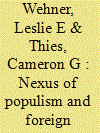

|
|
|
|
|
| Summary/Abstract |
The term populism has recently gained visibility in the media and policy world to describe the foreign policy principles, rhetoric and strategies of political actors in the United States and some European states. Yet, populism is nothing new in Latin America where it has enjoyed a long tradition among leaders of various countries. Populism has thus far largely been treated as a national phenomenon with few international manifestations. Thus, this article adopts the concept of populism and its core components such as anti-elitism, the people, and the general will within a role theory framework to trace the foreign policy roles that populist governments play as a first step to improving our knowledge on the nexus of populism and foreign policy. We examine this framework in the context of the foreign policy of Carlos Menem of Argentina and Hugo Chávez of Venezuela.
|
|
|
|
|
|
|
|
|
|
|
|
|
|
|
|
| 4 |
ID:
190598
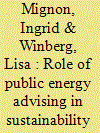

|
|
|
|
|
| Summary/Abstract |
Public energy advising is a policy measure used to provide customized energy information and advice to energy end-users. It aims at encouraging and promoting decisions leading to reduced environmental impact from energy use. While the independent function of public energy advising is unique and important, in Sweden, the role of energy advisors is changing. With new and more complex client demands as well as increasing competition from other forms of advising, there is a need to examine the shift that public energy advising is facing. The aim is to provide an overview of the activities performed by public energy advisors in Sweden and to explore the roles that they play in the transition to a sustainable energy system. Based on a qualitative analysis of 129 activity reports from Swedish municipal energy advisors, this paper shows that public energy advisors do not only play a role on an actor-level, but also on a system-level, by undertaking activities connecting the target groups to other actors in society and translating national policy to the local level. These system-level roles represent an important potential for policies aimed at accelerating the energy transition, and thus they should be encouraged and maximized.
|
|
|
|
|
|
|
|
|
|
|
|
|
|
|
|
| 5 |
ID:
181055


|
|
|
|
|
| Summary/Abstract |
How ambitious, active and influential are countries and regional groups in global environmental negotiations? We construct eight ideal types of their roles based on ambition, activity and influence. We then examine how the roles of countries and regional groups are perceived by participants in these negotiations through a large-scale online survey. The European Union, Norway and the African Group are perceived as the most prominent reformist leaders, being highly ambitious, active and influential. On the contrary, India, the Russian Federation and many regional groups are mostly perceived as conservative bystanders, with low levels of ambition, activity and influence.
|
|
|
|
|
|
|
|
|
|
|
|
|
|
|
|
| 6 |
ID:
193012
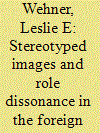

|
|
|
|
|
| Summary/Abstract |
Populist leaders unfold anti-elite rhetoric to sustain the ‘in-group’ morale of the ‘people’ they represent. Populist projects contain an ‘us’ versus ‘them’ dimension constituted by the stereotyped images that serve to inform the role-selection process in foreign policy. When images shaping roles on the international stage are used against the ‘out-group’, they become stereotypes of other actors. Therefore, this article explores how anti-pluralist populist leaders such as Jair Bolsonaro and Donald Trump use stereotyped images, and how these images – which speak to intention, affective tags and the evaluation of options – shape the foreign policy role behaviour of the states in question. The article develops a framework at the interplay of images and roles to analyse how these two aspects are used by the leader in an oversimplified manner to delineate boundaries between self and other, and thus to identify the membership base of the populist project versus those who are seen as a threat to their populist foreign policy.
|
|
|
|
|
|
|
|
|
|
|
|
|
|
|
|
| 7 |
ID:
183891
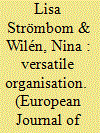

|
|
|
|
|
| Summary/Abstract |
What roles are military institutions expected to play in today's rapidly changing security environment? How are they supposed to interact with the society they are tasked to protect? These questions have been posed by classical military sociologists as well as by a newer generation of scholars. Yet so far, a comprehensive mapping of the military's potential roles in contemporary society is missing. In this article we contribute to an update of this debate by providing a categorisation of the different roles and tasks that the military institution plays in current industrialised democratic states. We identify three core roles, each divided into subroles, by drawing on an extensive reading of 70 National White Papers and Security Strategies from 37 OECD member states: (collective) defence, collective security, and aid to the nation. We analyse how these roles and tasks influence recent configurations in civil-military relations. This study thereby contributes with: (1) a useful illustration of the military's shifting roles and tasks in contemporary society; (2) increased understandings of how the different roles impact civil-military relations and related to this; and (3) a practical starting point for further analyses of the military organisation's internal challenges related to its, at times, contradictory roles.
|
|
|
|
|
|
|
|
|
|
|
|
|
|
|
|